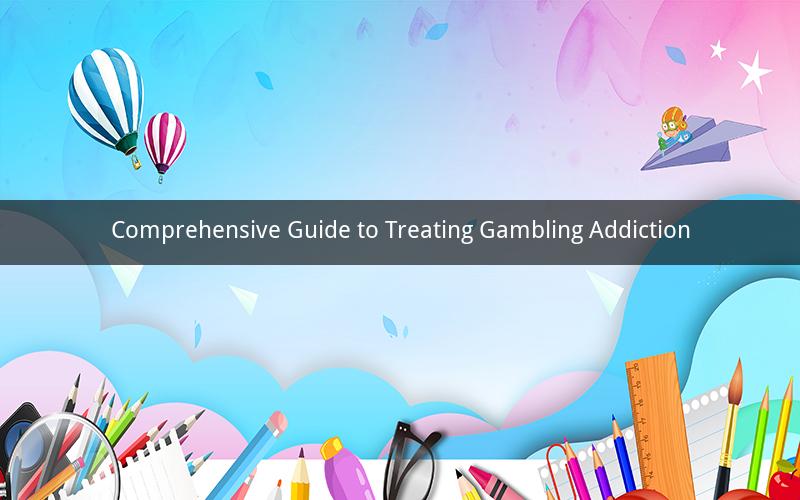
Gambling addiction, also known as compulsive gambling, is a serious issue that affects millions of people worldwide. It is characterized by an uncontrollable urge to gamble, despite the negative consequences it may have on one's life. If you or someone you know is struggling with gambling addiction, it is crucial to understand the available treatments and how they can help. This article will delve into the various treatment options for gambling addiction, offering insight into what works and what doesn't.
1. Therapy
Therapy is one of the most common and effective treatments for gambling addiction. It can help individuals understand the underlying causes of their addiction and develop strategies to cope with cravings and triggers. Here are some therapy options:
a. Cognitive Behavioral Therapy (CBT): CBT focuses on identifying and changing negative thought patterns and behaviors that contribute to gambling addiction. It has been shown to be particularly effective in treating gambling addiction.
b. Dialectical Behavior Therapy (DBT): DBT is a type of therapy that teaches individuals how to manage emotions and reduce impulsivity. It can be helpful for those with co-occurring disorders, such as depression or anxiety.
c. Family Therapy: Family therapy can help repair relationships damaged by gambling addiction and provide support for both the individual and their loved ones.
2. Medication
While there is no medication specifically designed to treat gambling addiction, certain medications can help manage symptoms of co-occurring disorders, such as depression or anxiety. These medications may include:
a. Antidepressants: Antidepressants, such as SSRIs (Selective Serotonin Reuptake Inhibitors) and SNRIs (Serotonin-Norepinephrine Reuptake Inhibitors), can help alleviate symptoms of depression and anxiety.
b. Mood Stabilizers: Mood stabilizers, such as lithium and valproate, can be used to treat bipolar disorder, which may co-occur with gambling addiction.
3. Self-Help Groups
Self-help groups, such as Gamblers Anonymous (GA), can provide support and encouragement for individuals struggling with gambling addiction. These groups offer a safe space for individuals to share their experiences, learn from others, and develop coping strategies.
4. Residential Treatment Programs
Residential treatment programs offer a structured environment where individuals can receive intensive treatment for gambling addiction. These programs often include therapy, group support, and educational workshops. They can be beneficial for those with severe addiction or co-occurring disorders.
5. Online Resources
The internet is a valuable resource for those struggling with gambling addiction. There are numerous websites and online support groups that can provide information, guidance, and support. Some popular online resources include:
a. Gamblers Anonymous Online: Gamblers Anonymous offers an online meeting schedule and chat rooms for individuals seeking support.
b. Gam-Anon: Gam-Anon is a support group for family members and friends of individuals with gambling addiction.
6. Prevention and Relapse Prevention
Prevention and relapse prevention are crucial components of treating gambling addiction. This involves:
a. Identifying and avoiding triggers: Triggers are situations or emotions that may prompt gambling behavior. Identifying and avoiding these triggers can help prevent relapse.
b. Building a support network: A strong support network of friends, family, and professionals can provide encouragement and assistance when dealing with cravings and challenges.
c. Setting goals and celebrating achievements: Setting and achieving goals can help individuals stay motivated and focused on their recovery journey.
In conclusion, treating gambling addiction requires a comprehensive approach that includes therapy, medication, self-help groups, residential treatment programs, and online resources. By understanding the available treatment options and implementing prevention strategies, individuals can overcome their addiction and lead a healthier, more fulfilling life.
Here are five questions related to the treatment of gambling addiction and their answers:
1. Question: What is the most effective treatment for gambling addiction?
Answer: The most effective treatment for gambling addiction varies from person to person. However, cognitive behavioral therapy (CBT) has been shown to be particularly effective in treating gambling addiction.
2. Question: Can medication help treat gambling addiction?
Answer: While there is no medication specifically designed to treat gambling addiction, certain medications can help manage symptoms of co-occurring disorders, such as depression or anxiety. These medications may include antidepressants and mood stabilizers.
3. Question: How can family members support someone with gambling addiction?
Answer: Family members can support someone with gambling addiction by offering empathy, understanding, and encouragement. They can also seek support for themselves through family therapy or support groups like Gam-Anon.
4. Question: What are the signs of a gambling addiction relapse?
Answer: Signs of a gambling addiction relapse may include a return to gambling behavior, increased stress, financial problems, and feelings of guilt or shame. Recognizing these signs can help individuals seek help and prevent a full-blown relapse.
5. Question: Can online resources be effective in treating gambling addiction?
Answer: Yes, online resources can be effective in treating gambling addiction. They provide access to support groups, educational materials, and guidance from professionals. Online resources can be particularly helpful for individuals who have limited access to in-person treatment options.